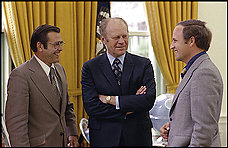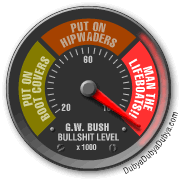The Ford Interview: Iraq a "mistake"
 President Gerald R. Ford, center, with Chief of Staff Donald H. Rumsfeld, left, and Rumsfeld's assistant, Dick Cheney, on April 28, 1975. (By David Hume Kennerly -- Ford Library Via Associated Press)
President Gerald R. Ford, center, with Chief of Staff Donald H. Rumsfeld, left, and Rumsfeld's assistant, Dick Cheney, on April 28, 1975. (By David Hume Kennerly -- Ford Library Via Associated Press)
(As reported by The Washington Post)
On July 28, 2004, former president Gerald R. Ford sat down for an interview with The Washington Post's Bob Woodward. The interview was conducted at Ford's Beaver Creek, Colo., house; the former president agreed that his comments could be published any time after his death. Below are excerpts from the interview:
Ford says he does not believe the United States should intervene militarily overseas unless it is directly in America's national interests.
Ford says that, based on the facts as he understands them, he does not think that he would have ordered the Iraq war if he had been president.
Ford says he believes that President Bush, Vice President Cheney and Secretary of Defense Rumsfeld erred in justifying the Iraq war as one aimed at eliminating Saddam Hussein's weapons of mass destruction.
Ford says that while he never publicly criticized the Bush administration's war in Iraq, he does think they made a mistake in how they justified the war.
"I don't think I would have gone to war," he said a little more than a year after President Bush launched the invasion advocated and carried out by prominent veterans of Ford's own administration.
During the four-hour conversation at his house in Beaver Creek, Colo., Ford "very strongly" disagreed with the current president's justifications for invading Iraq and said he would have pushed alternatives, such as sanctions, much more vigorously. In the tape-recorded interview, Ford was critical not only of Bush but also of Vice President Cheney -- Ford's White House chief of staff -- and then-Defense Secretary Donald H. Rumsfeld, who served as Ford's chief of staff and then his Pentagon chief.
"Rumsfeld and Cheney and the president made a big mistake in justifying going into the war in Iraq. They put the emphasis on weapons of mass destruction," Ford said. "And now, I've never publicly said I thought they made a mistake, but I felt very strongly it was an error in how they should justify what they were going to do."
In a conversation that veered between the current realities of a war in the Middle East and the old complexities of the war in Vietnam whose bitter end he presided over as president, Ford took issue with the notion of the United States entering a conflict in service of the idea of spreading democracy.
"Well, I can understand the theory of wanting to free people," Ford said, referring to Bush's assertion that the United States has a "duty to free people." But the former president said he was skeptical "whether you can detach that from the obligation number one, of what's in our national interest." He added: "And I just don't think we should go hellfire damnation around the globe freeing people, unless it is directly related to our own national security."
The Ford interview -- and a subsequent lengthy conversation in 2005 -- took place for a future book project, though he said his comments could be published at any time after his death. In the sessions, Ford fondly recalled his close working relationship with key Bush advisers Cheney and Rumsfeld while expressing concern about the policies they pursued in more recent years.
"He was an excellent chief of staff. First class," Ford said. "But I think Cheney has become much more pugnacious" as vice president. He said he agreed with former secretary of state Colin L. Powell's assertion that Cheney developed a "fever" about the threat of terrorism and Iraq. "I think that's probably true."
Describing his own preferred policy toward Saddam Hussein's Iraq, Ford said he would not have gone to war, based on the publicly available information at the time, and would have worked harder to find an alternative. "I don't think, if I had been president, on the basis of the facts as I saw them publicly," he said, "I don't think I would have ordered the Iraq war. I would have maximized our effort through sanctions, through restrictions, whatever, to find another answer."













4 Comments:
Goes to show that there are some good smart Republicans out there...
;)
That's right Mark - Dead ones! Lincoln, Teddy R. etc.
Robert - Does that mean that Bush will live forever or that he's not a real Republican? ;)
No, he's just not a "real" smart Republican!
Post a Comment
<< Home